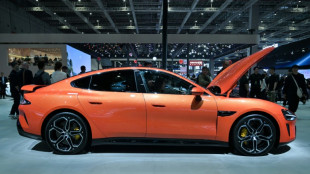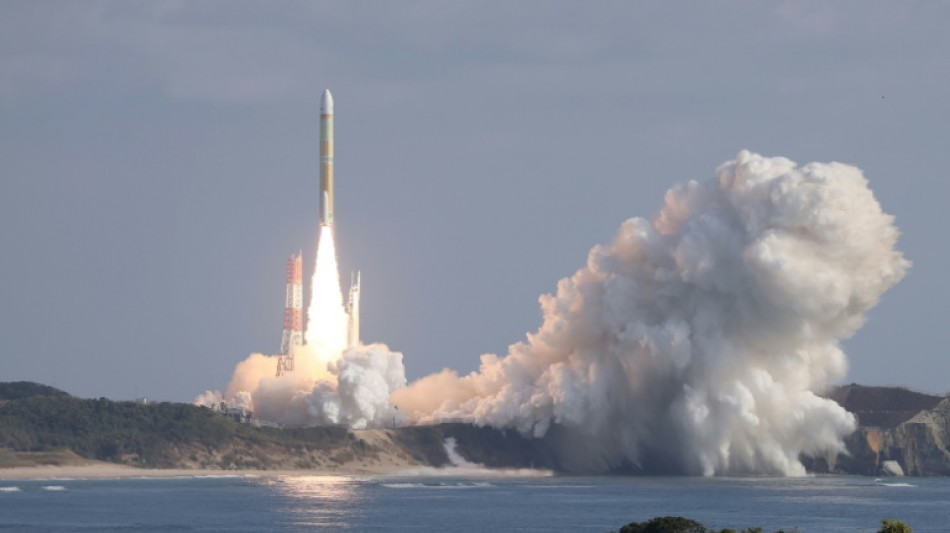
-
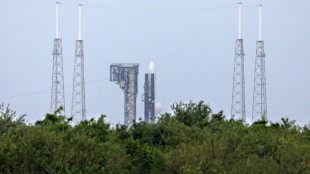 Amazon launches first Starlink-rival internet satellites
Amazon launches first Starlink-rival internet satellites
-
US lost seven multi-million-dollar drones in Yemen area since March
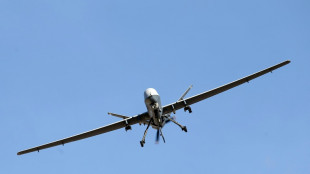
-
 Bucks blow as Lillard suffers torn Achilles: team
Bucks blow as Lillard suffers torn Achilles: team
-
Putin orders three-day truce amid new US warnings

-
 Real Madrid's Ancelotti agrees Brazil deal - reports
Real Madrid's Ancelotti agrees Brazil deal - reports
-
ChatGPT adds shopping help, intensifying Google rivalry

-
 Global stocks mixed amid trade hopes as markets await tech earnings
Global stocks mixed amid trade hopes as markets await tech earnings
-
Commanders heading back to D.C. after inking $3.7 bln stadium deal

-
 US warplane falls off aircraft carrier into Red Sea
US warplane falls off aircraft carrier into Red Sea
-
Feisty Arteta urges Arsenal fans to 'bring boots' to PSG Champions League clash

-
 Bucks blow as Lillard suffers ruptured Achilles: reports
Bucks blow as Lillard suffers ruptured Achilles: reports
-
No power, no phone, no transport -- Spain in a panic

-
 US warplane went overboard into Red Sea: Navy
US warplane went overboard into Red Sea: Navy
-
'Like a dream' as IPL's 14-year-old Suryavanshi becomes youngest to hit T20 ton

-
 Luis Enrique says PSG have improved since October Arsenal loss
Luis Enrique says PSG have improved since October Arsenal loss
-
UN food, refugee agencies warn of huge cuts after funding losses

-
 Trump trade war dominates BRICS meeting in Brazil
Trump trade war dominates BRICS meeting in Brazil
-
Rashford expected to miss rest of Aston Villa season

-
 IPL's 14-year-old Suryavanshi youngest to hit T20 ton as Rajasthan rule
IPL's 14-year-old Suryavanshi youngest to hit T20 ton as Rajasthan rule
-
Halle Berry, Jeremy Strong to join Cannes film festival jury: organisers

-
 Klopp congratulates Liverpool on Premier League triumph
Klopp congratulates Liverpool on Premier League triumph
-
Violence-weary Trinidadians vote in general election

-
 Abuse scandal in focus in search for new pope
Abuse scandal in focus in search for new pope
-
Prince William and Kate mark wedding anniversary in Scotland

-
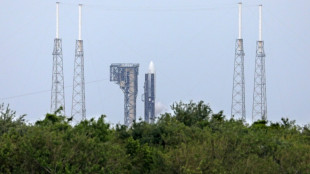 Amazon set for launch of Starlink-rival satellites
Amazon set for launch of Starlink-rival satellites
-
London mayor Sadiq Khan targets Olympic history for city

-
 Stock markets diverge amid trade hopes, ahead of earnings
Stock markets diverge amid trade hopes, ahead of earnings
-
Canada votes as Trump renews US takeover push

-
 Massive blackout hits all of Spain and Portugal
Massive blackout hits all of Spain and Portugal
-
Conclave starts May 7, cardinals say new pope must tackle abuse

-
 BRICS ministers meet in Brazil over Trump trade policies
BRICS ministers meet in Brazil over Trump trade policies
-
Trump escalates immigration crackdown to mark 100 days

-
 Outkast, White Stripes, Cyndi Lauper among Rock Hall inductees
Outkast, White Stripes, Cyndi Lauper among Rock Hall inductees
-
Putin orders three-day truce in May but Ukraine asks 'Why wait?'

-
 Eubank Jr discharged from hospital following boxing grudge match
Eubank Jr discharged from hospital following boxing grudge match
-
China deploys army of fake NGOs at UN to intimidate critics: media probe

-
 Empty shelves? US Treasury secretary not concerned 'at present'
Empty shelves? US Treasury secretary not concerned 'at present'
-
Slot told Liverpool they could win the league at season start: Konate

-
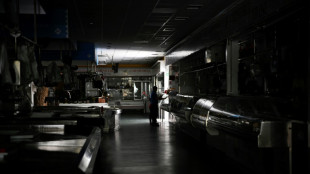 Spain brought to a halt by huge blackout
Spain brought to a halt by huge blackout
-
Stock markets mostly higher amid trade talk hopes

-
 Conclave starts May 7, with cardinals saying new pope must tackle abuse
Conclave starts May 7, with cardinals saying new pope must tackle abuse
-
Massive blackout hits Spain and Portugal

-
 Ruediger 'must show respect to others' says Germany boss Voeller
Ruediger 'must show respect to others' says Germany boss Voeller
-
As Canada votes, Trump pushes US takeover plan

-
 Ten on trial in Paris over 2016 gunpoint robbery of Kim Kardashian
Ten on trial in Paris over 2016 gunpoint robbery of Kim Kardashian
-
African players in Europe: Salah scores, takes selfies as Reds seal title

-
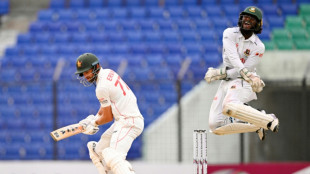 Bangladesh spinner Taijul's 5 wickets trigger Zimbabwe collapse in 2nd Test
Bangladesh spinner Taijul's 5 wickets trigger Zimbabwe collapse in 2nd Test
-
French mosque murder suspect, 21, surrenders in Italy

-
 Mayor Khan keen for London to make Olympics history
Mayor Khan keen for London to make Olympics history
-
Iranian president visits Azerbaijan as ties warm


Japan successfully launches next-gen H3 rocket
Japan's space agency toasted a successful blast-off for its new flagship rocket on Saturday, making it third time lucky after years of delays and two previous failed attempts.
The next-generation H3 has been mooted as a rival to SpaceX's Falcon 9, and could one day deliver cargo to bases on the Moon.
"I've been in the space industry for a long time, but I've never felt so happy before, and I've never felt so relieved," said Hiroshi Yamakawa, president of space agency JAXA.
The latest launch follows Japan's successful landing last month of an unmanned probe on the Moon -- albeit at a wonky angle -- making it just the fifth country to land a craft on the lunar surface.
The H3 launched from the Tanegashima Space Center in southwestern Japan at 9:22 am (0022 GMT).
Cheers and applause could be heard from the JAXA control centre after the agency's live stream announced the H3's engines had successfully burned, meaning the rocket had made it into orbit.
Developed jointly by JAXA and Mitsubishi Heavy Industries, the H3 is the successor to the H-IIA launch system, which debuted in 2001.
Designed for "high flexibility, high reliability, and high cost performance", the craft will "maintain Japan's autonomous access to space", JAXA says.
Unlike the reusable Falcon 9, the H3 is expendable, but scientists say the trial of its world-first technology is significant.
"The H3 rocket has a unique and novel first-stage engine that delivers greater thrust compared to state-of-the-art rockets," said Michele Trenti, director of the Melbourne Space Laboratory at the University of Melbourne.
The H3 "has the potential to be the most cost-effective rocket", making the exploration of the solar system more affordable.
Its maiden launch has been beset by mishaps.
A February 2023 launch was abandoned after ignition issues left the rocket standing motionless on the ground.
On the second try in March last year, technical problems meant a destruct command was issued shortly after blast-off.
Even this latest launch was postponed by four days due to bad weather.
The rocket which took off successfully on Saturday was carrying two small satellites.
One of the microsatellites is expected to contribute to disaster prevention by taking photos and videos.
The other, equipped with a sensor to detect infrared rays, is intended to track the operation conditions of factories on the ground.
Separation of the microsatellites was also confirmed, according to JAXA's live stream.
"We will keep analysing the sequences after successfully putting the rocket into orbit," a JAXA official said.
- Greater thrust -
H3 will be "an all-rounder -- able to launch satellites into Earth orbit, serve as a supply vehicle for space stations, and go to the Moon", said associate professor Alice Gorman, a space exploration expert at Flinders University.
The successful launch bolsters JAXA's reputation after a string of failures, including of a different rocket, a solid-fuel model called the Epsilon-6.
Japan succeeded in landing its SLIM spacecraft nicknamed "Moon Sniper" on the lunar surface last month, although the craft's solar panels were facing the wrong way.
Despite recent failures, overall, Japan's space programme punches above its weight, said Adrian Michael Cruise, an honorary professor of astrophysics at the University of Birmingham.
The country "has future ambitions for space exploration challenging some of the major players", he said.
"However, space payloads are getting heavier and heavier, and to remain competitive in the missions it can mount, Japan needs access to more powerful launch vehicles, like H3."
Y.Aukaiv--AMWN
